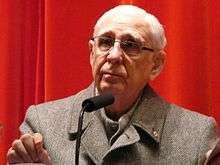Fernando Cardenal

Fernando Cardenal Martínez (26 January 1934 – 20 February 2016) was a Nicaraguan Jesuit and liberation theologian.
Nicaraguan Revolution
Born in Granada, Nicaragua, he served as Minister of Education from 1984 to 1990, during the Sandinista era. His brother, poet Ernesto Cardenal, also a Catholic priest, served as Minister of Culture from 1979 to 1987.
Because of his ties to the leftist Sandinistas and liberation theology, he was forced to leave the Society of Jesus, and, together with his brother Ernesto, he had his priesthood suspended directly by Pope John Paul II, an anticommunist, on the grounds that his roles as a priest and a government minister were incompatible. In an open letter published in 1984, he wrote: "I cannot conceive of a God that would ask me to abandon my commitment to the people […] From my point of view, and from my personal experience, it is possible to live […] simultaneously (in) fidelity to the church as a Jesuit and as a priest, and also devote myself to the service of the poor in Nicaragua from within the Sandinista revolution." Cardenal left political office in 1990, and was subsequently reinstated into the Jesuit order in 1997.
In 1980, Cardenal led the Nicaraguan Literacy Campaign, a Sandinista effort that succeeded in teaching basic literacy to more than half a million people with the help of 60,000 young volunteers.
Later life
Fernando Cardenal was a director at the Fe y Alegría organization in Managua, Nicaragua.[1] Through the organization, Cardenal was able to help provide education for the poor in Nicaragua. Since 1997, the year that he was readmitted to the Jesuits, Cardenal was an active priest. He was readmitted after four years had passed since he renounced his membership in the Sandinista National Liberation Front (the Sandinistas).[2]
Cardenal made several visits to Jesuit universities in the United States, such as to the University of Detroit Mercy in 2013 and to the John Carrol University in 2014. He talked there about his commitment to help the poor and his experience as a Jesuit priest and liberation theologian during the Nicaraguan Revolution.[3][4] He has gave several interviews to discuss his involvement in the Nicaraguan Revolution as a minister of education, his commitment to the poor, and the current state of education in Nicaragua which links to his current involvement in Fe y Alegría. He gave an interview to an undergraduate student at Georgetown University in 2014.[5] He died in Managua in 2016.[6]
Family
Fernando Cardenal was born into a wealthy and influential family in Granada, Nicaragua, as the fifth son of Rodolfo Cardenal and Esmeralda Martinez. One of his brothers is Ernesto Cardenal, a Nicaraguan Catholic priest, poet and politician. He is also a first cousin of the poet Pablo Antonio Cuadra.
References
- ↑ "Fe y Alegria in Nicaragua". Retrieved 22 April 2015.
- ↑ Wooden, Cindy (6 August 2014). "Pope lifts suspension of Father D'Escoto, former Sandinista official". Catholic News Service/USCCB. Archived from the original on 9 January 2015. Retrieved 22 April 2015.
- ↑ Fichter, Ruth Esther. "Fr. Fernando Cardenal: Nicaraguan Jesuit and activist". University of Detroit Mercy - A Catholic University in the Jesuit & Mercy Traditions. Archived from the original on 23 May 2015. Retrieved 22 April 2015.
- ↑ "Fernando Cardenal, S.J." John Carrol University. Retrieved 22 April 2015.
- ↑ Maita, Gianna (30 July 2014). "A Discussion with Father Fernando Cardenal, S.J., National Director of Fe y Alegría, Managua, Nicaragua". Berkley Center For Religion, Peace & World Affairs at Georgetown University. Retrieved 22 April 2015.
- ↑ "Fernando Cardenal, Rebel Priest Who Defied Pope, Dies at 82". teleSUR. Retrieved 22 February 2016.
External links
| Wikimedia Commons has media related to Fernando Cardenal. |